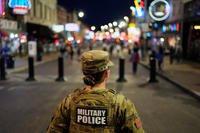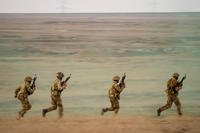It seemed like a bit of good news -- new data this week showed a 15% overall drop in suicides among the active-duty military -- but the National Guard has just not seen the same trend.
The Guard's suicide rate has remained relatively unchanged for a decade as Pentagon planners are seemingly unable to get proper resources to part-time troops, and that's partly due to the various duty statuses they operate under. While on state orders or off duty, they have limited access to resources such as behavioral health specialists.
"We see them two-three days a month, and it's a challenge for us. We try to provide the resources," Maj. Gen. Eric K. Little, director, National Guard Bureau Manpower and Personnel, told reporters at a press conference Friday.
Read Next: Housing Allowance Shouldn't Stop Hungry Troops from Getting Food Stamps, Senators Say
Suicides in the Army National Guard make up the overwhelming majority with 102 deaths in 2021, according to Pentagon data released Thursday. The Air National Guard saw 15 deaths by suicide. Both of those figures are relatively unchanged from 2020, with 105 and 16 suicides, respectively.
A Guard spokeswoman said that an additional two Guardsmen were recently confirmed to have died by suicide and that was not reflected in the data. It is unclear why there is such a big gap in suicide deaths between the Army and Air Guard, but Little attributes at least some of that to air units mostly being on military bases where some mental health resources are available, while Army units are spread out all over the country.
The duty statuses for Guardsmen, which determine what military resources they're entitled to and when, are a mess of complicated personnel policies.
Troops on federal orders, which are usually reserved for overseas missions and national emergencies such as the COVID-19 pandemic, have access to a full spectrum of military benefits, including assistance that could help reduce suicides.
While on state orders issued by governors, Guard troops do not have access to military resources and are often paid less than typical active-duty pay. When part-time troops are off duty, where they spend the bulk of their time, they have limited access to resources such as behavioral health specialists. And even if they did, most Guardsmen live nowhere near a military base.
Those issues have spurred calls from some military leaders for benefits and status reform for the National Guard. Guardsmen also are not entitled to free health care, something that is a key issue for Gen. Daniel Hokanson, the chief of the National Guard Bureau. He estimates roughly 60,000 part-time troops are uninsured, and extending health care coverage would cost about $719 million per year.
Benefits reform has yet to gain much traction on Capitol Hill. Outright status reform could fundamentally reshape how troops are deployed and paid -- and lead to a minefield of bureaucratic issues.
But Little says it's something that has to be done.
"If you're not in any status, you can't go to a military treatment facility where many of these resources are," he said. "Those are some long-term things we need to really get after. ... I think there are some significant efforts in the department and in the bureau to make that happen."
While Little and other leaders across all services continue to analyze mental health issues among the rank and file, some leaders are leaning more on noncommissioned officers to identify red flags in their formations early and get those soldiers the help they need before the issue gets more serious.
"The first-line leaders are key for this," Little said. "You want to have the culture that the soldier can go to the first-line leader even off duty."
In addition, the Pentagon has tried to place an emphasis on reducing the stigma of seeking mental health care, and quashing misinformation in some formations that seeking care can torpedo careers and put security clearances at risk. According to data from the Defense Counterintelligence and Security Agency, between 2012 and 2020, less than 1% of security clearances were affected by mental health treatment.
Meanwhile, early data for the first half of 2022 show suicide has dropped in the National Guard compared to the same timeframe last year.
However, it will likely take years of additional data to show whether the Defense Department has made serious strides in reducing suicides, as it tries to reduce the stigma of seeking mental health resources and has made those resources more available.
The active-duty Army in recent years has zeroed in on quality-of-life issues. Service leaders hope it can have a cumulative effect on improving mental health among the rank and file. Those issues range from limited bans of Army leaders reaching out to their subordinates on the phone after typical working hours to planned construction and renovations of barracks.
Editor's note: This story has been updated to correct the estimated cost of free health care for all Guardsmen.
-- Steve Beynon can be reached at Steve.Beynon@military.com. Follow him on Twitter @StevenBeynon.
Related: Should the National Guard Get Free Health Care? Gen. Hokanson Is Trying to Make it Happen














